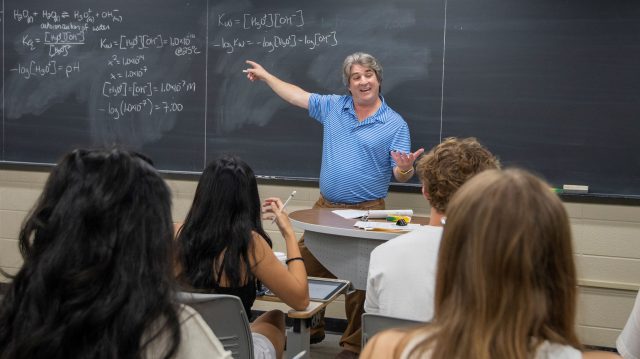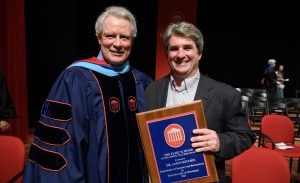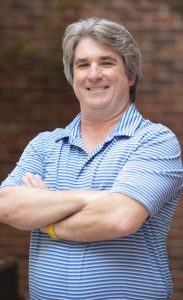
Jason Ritchie, associate professor of chemistry and biochemistry, leads a freshman chemistry class in Coulter Hall. Ritchie is the 2023 recipient of the university’s Elsie M. Hood Outstanding Teacher Award. Photo by Srijita Chattopadhyay/Ole Miss Digital Imaging Services
OXFORD, Miss. – Jason Ritchie has received many awards and honors in his 23 years of teaching at the University of Mississippi. But the 2023 recipient of the Elsie M. Hood Outstanding Teacher Award says the latest ranks as his most rewarding.
The associate professor of chemistry and biochemistry was presented the coveted accolade by Chancellor Glenn Boyce on Thursday evening (April 13) during the 80th annual Honors Day Convocation. Ritchie said he was overjoyed and humbled by the recognition.
“I’m extremely grateful that my students and colleagues have taken the time to nominate and recommend me for this award,” Ritchie said. “I try very hard to be the most effective classroom teacher I can be, and I’m glad that my students recognize that.”
Ritchie joined the Ole Miss faculty as an assistant professor in 2000. Over the past two decades, he has been promoted to associate professor. Ritchie also runs a research laboratory studying polymer electrolytes for fuel cells and batteries, with both graduate student and undergraduate researchers.
“Dr. Ritchie has a longstanding commitment to teaching excellence,” said Patrick Alexander, associate professor of English and African American studies and chair of the selection committee.
“Nominators have described him as both brilliant and caring; that is, he has been dedicated to sharing with students both his vast knowledge of the subject of chemistry and his genuine interest in contributing meaningfully to students’ overall learning experiences in every class session.”
One student described Ritchie as “an absolutely amazing professor.” Another said that he “creates a welcoming environment … making himself readily available for questions and exploring the real-world applications of chemistry. His enthusiasm for his subject infiltrates students’ attitudes.”
Ritchie credited several colleagues for his career success at the university.
“Maurice Eftink has been a mentor for me since arriving at Ole Miss,” he said. “We’ve collaborated on big projects like the regional and state science fairs.
“I’ve also really enjoyed working with Dr. Josh Eyler in the Center for Excellence in Teaching and Learning – especially on active learning techniques in the classroom – and Stephen Monroe from writing and rhetoric, who just recently brought me into serving on the Common Reading Selection Committee.”
A nomination letter from one student notes that, “Of the 17 freshman courses I have taken, none stand out more than the chemistry courses taught by Dr. Ritchie. He is not just a good teacher; he is a good person. He cares.”
Another from a student who has taken his classes for three consecutive semesters said that Ritchie “not only can guide a class through abstract concepts, but he can accomplish this task at two different levels simultaneously since he instructs both a general and an honors section. This versatility in his teaching techniques should be commended.”
When asked about role models in education, Ritchie said he has paid attention to Carl Wieman, a Nobel laureate in physics who focused a much of his post-Nobel Prize efforts on encouraging faculty to engage with active learning techniques in the classroom.
“He’s convinced a lot of university faculty of the need to change the way we traditionally taught college science classes and to use proven techniques for increasing student learning,” Ritchie said. “I took my first POGIL training after reading one of his papers about the effectiveness of active learning techniques in the STEM classroom.”

Chancellor Glenn Boyce (left) congratulates Jason Ritchie, associate professor of chemistry and biochemistry, as the 2023 recipient of the Elsie M. Hood Outstanding Teacher Award at the university’s Honors Day Convocation. Photo by Thomas Graning/Ole Miss Digital Imaging Services
Process Oriented Guided Inquiry Learning, or POGIL, is an active learning teaching technique where students work in groups on a structured exercise that leads them through an inquiry process that helps them to build their own framework for understanding concepts in the course.
Ritchie earned a bachelor’s degree in chemistry at the University of California at San Diego in 1994, and a doctorate in inorganic chemistry at the University of Texas in 1998. He also did a postdoctoral research appointment at the University of North Carolina.
“I learned science with lots of other students in lecture halls listening to professors talk, and it’s a miracle we survived to get our degrees,” he said. “We’ve learned so much about how students actually learn the material in the course, and giving them a chance to actively try problems and work with the material in the classroom is an incredible boost to their understanding and problem-solving ability.”
Ritchie is the co-author of 20 refereed articles and more than a dozen chapters, and he has been the principal or co-principal investigator on external research grants totaling more than $7 million.
Teaching in the Sally McDonald Barksdale Honors College the past several years also has been fulfilling for Ritchie.
“I love seeing my students succeed, but I also really love it when I am able to reach a student who may be struggling and help them to become successful in my class,” he said. “It’s really a great feeling to see struggling students learn to be able to connect the dots for themselves and become successful in a college science class.”
Each year since 1966, the university has recognized excellence in teaching by presenting the Elsie M. Hood Outstanding Teacher Award.
Based on nominations from both students and faculty, the award includes a personal plaque and a cash award. Recipients’ names are also engraved on a plaque listing previous winners, which is displayed in the J.D. Williams Library.
